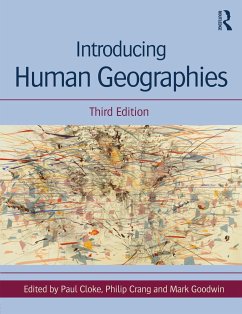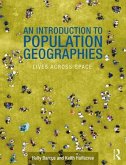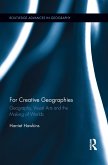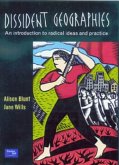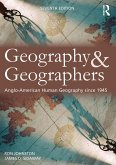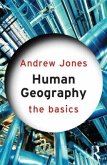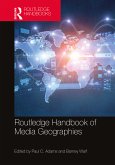Paul Cloke (UK University of Exeter), Philip Crang (UK Royal Holloway University of London), Mark Goodwin (UK University of Exeter)
Introducing Human Geographies
Paul Cloke (UK University of Exeter), Philip Crang (UK Royal Holloway University of London), Mark Goodwin (UK University of Exeter)
Introducing Human Geographies
- Broschiertes Buch
- Merkliste
- Auf die Merkliste
- Bewerten Bewerten
- Teilen
- Produkt teilen
- Produkterinnerung
- Produkterinnerung
A comprehensive, stimulating and cutting-edge guide with the latest thinking on essential topics such as population, biogeography and environmental geographies and new and exciting areas such as mobilities, securities and public spaces.
Andere Kunden interessierten sich auch für
![Introducing Human Geographies Introducing Human Geographies]() Introducing Human Geographies188,99 €
Introducing Human Geographies188,99 €![An Introduction to Population Geographies An Introduction to Population Geographies]() Holly R. Barcus (US Macalester College)An Introduction to Population Geographies65,99 €
Holly R. Barcus (US Macalester College)An Introduction to Population Geographies65,99 €![For Creative Geographies For Creative Geographies]() Harriet Hawkins (Royal Holloway, University of London, UK)For Creative Geographies69,99 €
Harriet Hawkins (Royal Holloway, University of London, UK)For Creative Geographies69,99 €![Dissident Geographies Dissident Geographies]() Alison Blunt (UK Queen Mary University of London)Dissident Geographies45,99 €
Alison Blunt (UK Queen Mary University of London)Dissident Geographies45,99 €![Geography and Geographers Geography and Geographers]() Ron Johnston (University of Bristol, England, UK)Geography and Geographers88,99 €
Ron Johnston (University of Bristol, England, UK)Geography and Geographers88,99 €![Human Geography Human Geography]() Andrew Jones (Birkbeck, University of London, UK)Human Geography20,99 €
Andrew Jones (Birkbeck, University of London, UK)Human Geography20,99 €![Routledge Handbook of Media Geographies Routledge Handbook of Media Geographies]() Routledge Handbook of Media Geographies47,99 €
Routledge Handbook of Media Geographies47,99 €-
-
-
A comprehensive, stimulating and cutting-edge guide with the latest thinking on essential topics such as population, biogeography and environmental geographies and new and exciting areas such as mobilities, securities and public spaces.
Hinweis: Dieser Artikel kann nur an eine deutsche Lieferadresse ausgeliefert werden.
Hinweis: Dieser Artikel kann nur an eine deutsche Lieferadresse ausgeliefert werden.
Produktdetails
- Produktdetails
- Verlag: Taylor & Francis Ltd
- 3 ed
- Seitenzahl: 1088
- Erscheinungstermin: 29. November 2013
- Englisch
- Abmessung: 249mm x 192mm x 48mm
- Gewicht: 2276g
- ISBN-13: 9781444135350
- ISBN-10: 144413535X
- Artikelnr.: 36702255
- Herstellerkennzeichnung
- Libri GmbH
- Europaallee 1
- 36244 Bad Hersfeld
- gpsr@libri.de
- Verlag: Taylor & Francis Ltd
- 3 ed
- Seitenzahl: 1088
- Erscheinungstermin: 29. November 2013
- Englisch
- Abmessung: 249mm x 192mm x 48mm
- Gewicht: 2276g
- ISBN-13: 9781444135350
- ISBN-10: 144413535X
- Artikelnr.: 36702255
- Herstellerkennzeichnung
- Libri GmbH
- Europaallee 1
- 36244 Bad Hersfeld
- gpsr@libri.de
Paul Cloke is Professor of Human Geography at the University of Exeter. Philip Crang is Professor of Cultural Geography at Royal Holloway, University of London. Mark Goodwin is Professor of Human Geography and Deputy Vice-Chancellor at the University of Exeter.
Part 1: Foundations 1. Local-global 2. Society-space 3. Human-non-human 4.
Modern-postmodern 5. Self-other 6. Masculinity-femininity 7. Science-art 8.
Explanation-understanding 9. Representation-reality Part 2: Themes Section
1. Biogeographies 10. Nature and Human Geography 11. Animals and Plants 12.
Political Ecology Section 2. Cartography 13. Power of Maps 14. Geographical
Information Systems 15. Counter Geographies Section 3. Cultural Geographies
16. Imaginative Geographies 17. Place 18. Landscape 19. Material
Geographies Section 4. Development Geographies 20. Theories of Development
21. Rethinking Development 22. Survival and Resistance 23. Human
Geographies of the Global South Section 5. Economic Geographies 24. Spaces
of Production 25. Money and Finance 26. Consumption-reproduction 27.
Commodities 28. Economic Globalization Section 6. Environmental Geographies
29. Global & Local Environmental Problems 30. Sustainability 31. Climate
Change Section 7. Historical Geographies 32. Modernity & Modernization 33.
Colonialism & Postcolonialism 34. Space, Memory & Identity Section 8.
Political Geographies 35. Critical Geopolitics 36. War & Peace 37.
Nationalism 38. Citizenship & Governance Section 9. Population Geographies
39. Age 40. Health and Well-being 41. Migrants and Refugees Section 10.
Social Geographies 42. Identities 43. Identity and Difference: Dis/ability
and Sexuality 44. Exclusion 45. Diasporas Section 11. Urban and Rural
Geographies 46. Urban Forms 47. Urban Senses 48. Rurality Part 3: Horizons
Section 12. Non-representational Geographies 49. Emotion 50. Affect 51.
Performances Section 13. Mobilities 52. Mobilities: Politics, Practices,
Places 53. Touring Mobilities 54. Virtual Mobilities Section 14. Securities
55. Risk/Fear/Surveillance 56. Resources 57. Securing Life: New hHzards and
Biosecurity Section 15. Publics 58. How to Think about Public Space 59.
Ethical Spaces
Modern-postmodern 5. Self-other 6. Masculinity-femininity 7. Science-art 8.
Explanation-understanding 9. Representation-reality Part 2: Themes Section
1. Biogeographies 10. Nature and Human Geography 11. Animals and Plants 12.
Political Ecology Section 2. Cartography 13. Power of Maps 14. Geographical
Information Systems 15. Counter Geographies Section 3. Cultural Geographies
16. Imaginative Geographies 17. Place 18. Landscape 19. Material
Geographies Section 4. Development Geographies 20. Theories of Development
21. Rethinking Development 22. Survival and Resistance 23. Human
Geographies of the Global South Section 5. Economic Geographies 24. Spaces
of Production 25. Money and Finance 26. Consumption-reproduction 27.
Commodities 28. Economic Globalization Section 6. Environmental Geographies
29. Global & Local Environmental Problems 30. Sustainability 31. Climate
Change Section 7. Historical Geographies 32. Modernity & Modernization 33.
Colonialism & Postcolonialism 34. Space, Memory & Identity Section 8.
Political Geographies 35. Critical Geopolitics 36. War & Peace 37.
Nationalism 38. Citizenship & Governance Section 9. Population Geographies
39. Age 40. Health and Well-being 41. Migrants and Refugees Section 10.
Social Geographies 42. Identities 43. Identity and Difference: Dis/ability
and Sexuality 44. Exclusion 45. Diasporas Section 11. Urban and Rural
Geographies 46. Urban Forms 47. Urban Senses 48. Rurality Part 3: Horizons
Section 12. Non-representational Geographies 49. Emotion 50. Affect 51.
Performances Section 13. Mobilities 52. Mobilities: Politics, Practices,
Places 53. Touring Mobilities 54. Virtual Mobilities Section 14. Securities
55. Risk/Fear/Surveillance 56. Resources 57. Securing Life: New hHzards and
Biosecurity Section 15. Publics 58. How to Think about Public Space 59.
Ethical Spaces
Part 1: Foundations 1. Local-global 2. Society-space 3. Human-non-human 4.
Modern-postmodern 5. Self-other 6. Masculinity-femininity 7. Science-art 8.
Explanation-understanding 9. Representation-reality Part 2: Themes Section
1. Biogeographies 10. Nature and Human Geography 11. Animals and Plants 12.
Political Ecology Section 2. Cartography 13. Power of Maps 14. Geographical
Information Systems 15. Counter Geographies Section 3. Cultural Geographies
16. Imaginative Geographies 17. Place 18. Landscape 19. Material
Geographies Section 4. Development Geographies 20. Theories of Development
21. Rethinking Development 22. Survival and Resistance 23. Human
Geographies of the Global South Section 5. Economic Geographies 24. Spaces
of Production 25. Money and Finance 26. Consumption-reproduction 27.
Commodities 28. Economic Globalization Section 6. Environmental Geographies
29. Global & Local Environmental Problems 30. Sustainability 31. Climate
Change Section 7. Historical Geographies 32. Modernity & Modernization 33.
Colonialism & Postcolonialism 34. Space, Memory & Identity Section 8.
Political Geographies 35. Critical Geopolitics 36. War & Peace 37.
Nationalism 38. Citizenship & Governance Section 9. Population Geographies
39. Age 40. Health and Well-being 41. Migrants and Refugees Section 10.
Social Geographies 42. Identities 43. Identity and Difference: Dis/ability
and Sexuality 44. Exclusion 45. Diasporas Section 11. Urban and Rural
Geographies 46. Urban Forms 47. Urban Senses 48. Rurality Part 3: Horizons
Section 12. Non-representational Geographies 49. Emotion 50. Affect 51.
Performances Section 13. Mobilities 52. Mobilities: Politics, Practices,
Places 53. Touring Mobilities 54. Virtual Mobilities Section 14. Securities
55. Risk/Fear/Surveillance 56. Resources 57. Securing Life: New hHzards and
Biosecurity Section 15. Publics 58. How to Think about Public Space 59.
Ethical Spaces
Modern-postmodern 5. Self-other 6. Masculinity-femininity 7. Science-art 8.
Explanation-understanding 9. Representation-reality Part 2: Themes Section
1. Biogeographies 10. Nature and Human Geography 11. Animals and Plants 12.
Political Ecology Section 2. Cartography 13. Power of Maps 14. Geographical
Information Systems 15. Counter Geographies Section 3. Cultural Geographies
16. Imaginative Geographies 17. Place 18. Landscape 19. Material
Geographies Section 4. Development Geographies 20. Theories of Development
21. Rethinking Development 22. Survival and Resistance 23. Human
Geographies of the Global South Section 5. Economic Geographies 24. Spaces
of Production 25. Money and Finance 26. Consumption-reproduction 27.
Commodities 28. Economic Globalization Section 6. Environmental Geographies
29. Global & Local Environmental Problems 30. Sustainability 31. Climate
Change Section 7. Historical Geographies 32. Modernity & Modernization 33.
Colonialism & Postcolonialism 34. Space, Memory & Identity Section 8.
Political Geographies 35. Critical Geopolitics 36. War & Peace 37.
Nationalism 38. Citizenship & Governance Section 9. Population Geographies
39. Age 40. Health and Well-being 41. Migrants and Refugees Section 10.
Social Geographies 42. Identities 43. Identity and Difference: Dis/ability
and Sexuality 44. Exclusion 45. Diasporas Section 11. Urban and Rural
Geographies 46. Urban Forms 47. Urban Senses 48. Rurality Part 3: Horizons
Section 12. Non-representational Geographies 49. Emotion 50. Affect 51.
Performances Section 13. Mobilities 52. Mobilities: Politics, Practices,
Places 53. Touring Mobilities 54. Virtual Mobilities Section 14. Securities
55. Risk/Fear/Surveillance 56. Resources 57. Securing Life: New hHzards and
Biosecurity Section 15. Publics 58. How to Think about Public Space 59.
Ethical Spaces

